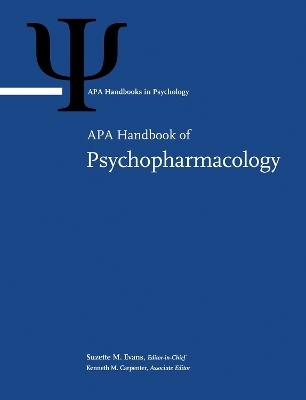
APA Handbook of Psychopharmacology
American Psychological Association (Verlag)
978-1-4338-3075-4 (ISBN)
- Titel z.Zt. nicht lieferbar
- Versandkostenfrei
- Auch auf Rechnung
- Artikel merken
The APA Handbook of Psychopharmacology provides a comprehensive working knowledge of basic pharmacology and psychopharmacology, examines the utility of pharmacotherapy for addressing different dimensions of human suffering, and highlights the broader professional and social issues surrounding this work in a language that is suitable for a broad readership.
This 33-chapter handbook is designed as a library reference that captures the most current research to date on pharmacotherapy strategies for addressing emotional and behavioral conditions, as an informative guide for educators and students to strengthen their understanding of the scientific and professional issues associated with the field of psychopharmacology, and as an invaluable desk reference for both researchers and practicing clinicians.
Chapters cover fundamental principles of pharmacology and psychopharmacology; psychopharmacology for the treatment of psychological disorders, substance use disorders, and addiction; and issues pertaining to professional training, policy, and industry. Most chapters include a tool kit of resources, providing recommended references that clinicians can use in practice and as educational and teaching tools to stay abreast of the latest developments on the pharmacological treatments for each disorder.
Suzette M. Evans, PhD, is a psychologist trained in biopsychology at The University of Chicago and in behavioral pharmacology at the Johns Hopkins University School of Medicine. She is currently a professor of clinical neurobiology (in psychiatry) at the Columbia University Vagelos College of Physicians and Surgeons and research scientist VI at the New York State Psychiatric Institute. She has been a member of the American Psychological Association (APA) and Division 28 (Psychopharmacology and Substance Abuse) since 1992. She served as president of Division 28 in 2007 and served as a member of the APA Board of Convention Affairs from 2011 to 2014. She is also a recent past editor of the APA journal Experimental and Clinical Psychopharmacology (2011–2017). Dr. Evans has more than 100 publications and 30 years of research experience that span preclinical research with laboratory animals, human laboratory research, and clinical treatment research in substance abuse. Over the past 25 years Dr. Evans has received continuous research funding, primarily from the National Institute on Drug Abuse. Much of her research has used controlled laboratory procedures in humans to examine the acute behavioral and reinforcing effects of drugs of abuse, including alcohol, cannabis, and cocaine. Her focus is identifying potential behavioral and neurobiological markers of vulnerability to identify high-risk individuals before they transition from casual recreational use to problematic drug use. Several of these factors include stress, impulsivity, and decision making. Moreover, she has been at the forefront of exploring the role of sex as a biological variable. Much of her past and current research focuses on examining potential differences between males and females, including hormonal influences across the menstrual cycle.
Editorial Board
About the Editor-in-Chief
Contributors
A Note From the Publisher
Introduction
Part I. Fundamental Principles of Pharmacology and Psychopharmacology
Chapter 1. A Brief History of Psychopharmacology in the Context of Psychology and Psychiatry
Chapter 2. Basic Information on Psychotropic Drugs, Receptor Systems, and the Brain
Chapter 3. Basic Psychopharmacology
Chapter 4. The Role of Animal Laboratory Research in Psychopharmacology
Chapter 5. The Role of Clinical (Human) Laboratory Research in Psychopharmacology
Chapter 6. Evidence-Based Pharmacotherapy
Part II. Implementing Psychopharmacology for the Treatment of Psychological Disorders, Substance Use Disorders, and Addiction
Section 1. Pharmacological Treatment of Psychological Disorders
Chapter 7. Pharmacological Treatment of Depressive Disorders
Chapter 8. Pharmacological Treatment of Bipolar Disorders
Chapter 9. Pharmacological Treatment of Anxiety Disorders
Chapter 10. Pharmacological Treatment of Schizophrenia and Other Psychotic Disorders
Chapter 11. Pharmacological Treatment of Obsessive-Compulsive Disorder and Related Disorders
Chapter 12. Pharmacological Treatment of Impulse Control Disorders
Chapter 13. Pharmacological Treatment of Trauma and Stressor-Related Disorders
Chapter 14. Pharmacological Treatment of Sleep–Wake Disorders
Chapter 15. Pharmacological Treatment of Eating Disorders
Chapter 16. Pharmacological Treatment of Attention-Deficit/Hyperactivity Disorder
Chapter 17. Pharmacological Treatment of Autism Spectrum Disorder
Chapter 18. Pharmacological Treatment of Neurocognitive Disorders
Chapter 19. Pharmacological Treatment of Pain and Pain-Related Disorders
Chapter 20. Pharmacological Treatment of Borderline Personality Disorder
Section 2. Pharmacological Treatment of Substance Use Disorders and Addiction
Chapter 21. General Introduction: Issues and Perspective on Medication Assisted Treatment
Chapter 22. Pharmacological Treatment of Alcohol Use Disorder
Chapter 23. Pharmacological Treatment of Cannabis Use Disorder
Chapter 24. Pharmacological Treatment of Psychostimulant Use Disorders
Chapter 25. Pharmacological Treatment of Opioid Use Disorders
Chapter 26. Pharmacological Treatment of Sedative and Anxiolytic Use Disorders
Chapter 27. Pharmacological Treatment of Tobacco Use Disorder
Chapter 28. Pharmacological Treatment of Behavioral Addictions
Part III. Psychopharmacology in Context: Issues Pertaining to Professional Training, Policy, and Industry
Chapter 29. Professional Psychology in the Context of Psychopharmacology: Ethical Issues, Education, and Training
Chapter 30. Psychologists and Integrated Behavioral Health Care Within the Framework of Psychopharmacology
Chapter 31. The Role of the Pharmaceutical Industry in the Treatment of Mental Health Disorders
Chapter 32. Nonpharmacological Neurotherapeutics: Principles and Methods of Brain Stimulation Therapy
Chapter 33. Future Directions in Theory, Research, Practice, and Policy
Index
| Erscheinungsdatum | 02.05.2019 |
|---|---|
| Reihe/Serie | APA Handbooks in Psychology® Series |
| Zusatzinfo | About 35 tables and 20 figures. In addition, most chapters contain a tool kit of resources. |
| Verlagsort | Washington DC |
| Sprache | englisch |
| Maße | 216 x 279 mm |
| Themenwelt | Schulbuch / Wörterbuch ► Lexikon / Chroniken |
| Geisteswissenschaften ► Psychologie ► Klinische Psychologie | |
| Medizin / Pharmazie ► Medizinische Fachgebiete ► Pharmakologie / Pharmakotherapie | |
| Medizin / Pharmazie ► Medizinische Fachgebiete ► Psychiatrie / Psychotherapie | |
| ISBN-10 | 1-4338-3075-2 / 1433830752 |
| ISBN-13 | 978-1-4338-3075-4 / 9781433830754 |
| Zustand | Neuware |
| Haben Sie eine Frage zum Produkt? |
aus dem Bereich


